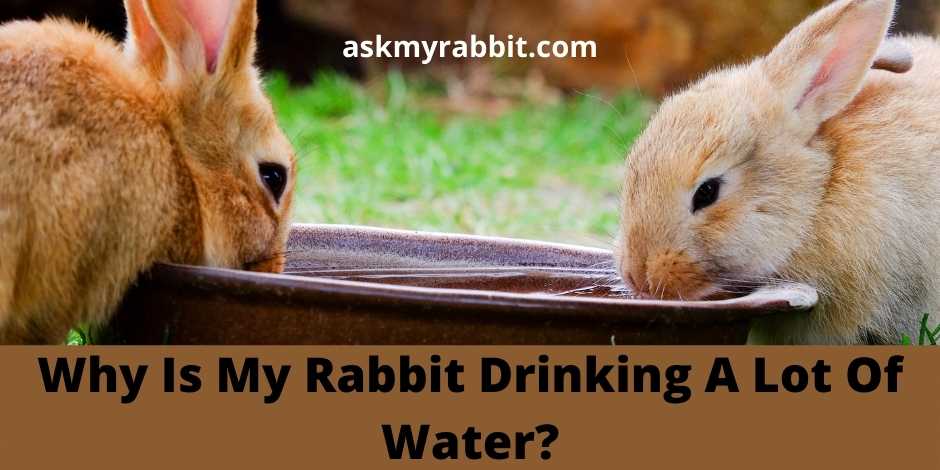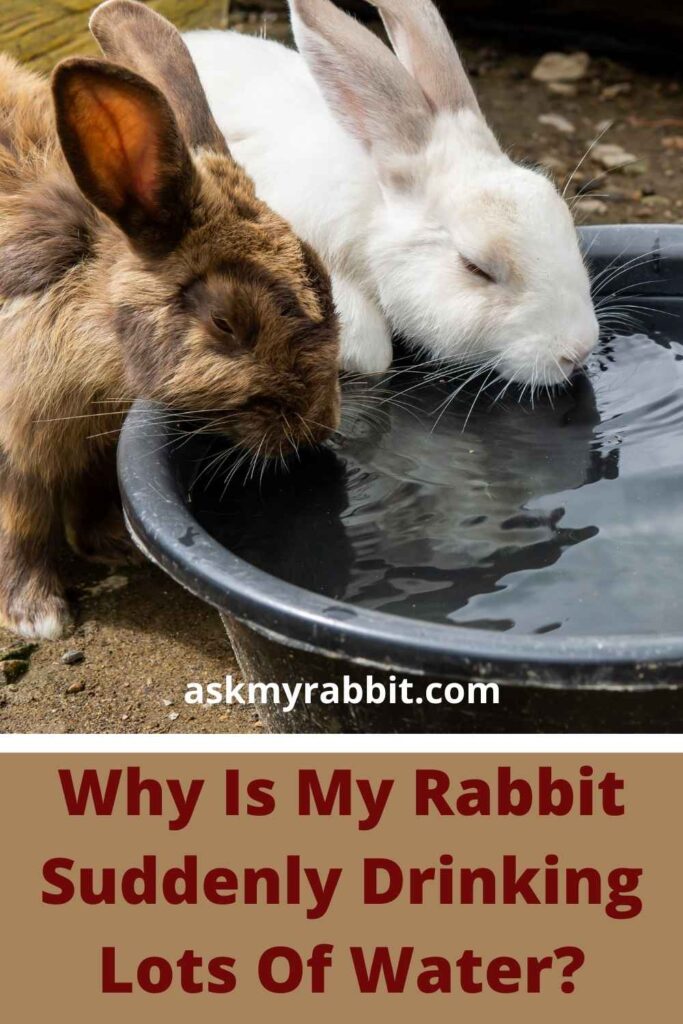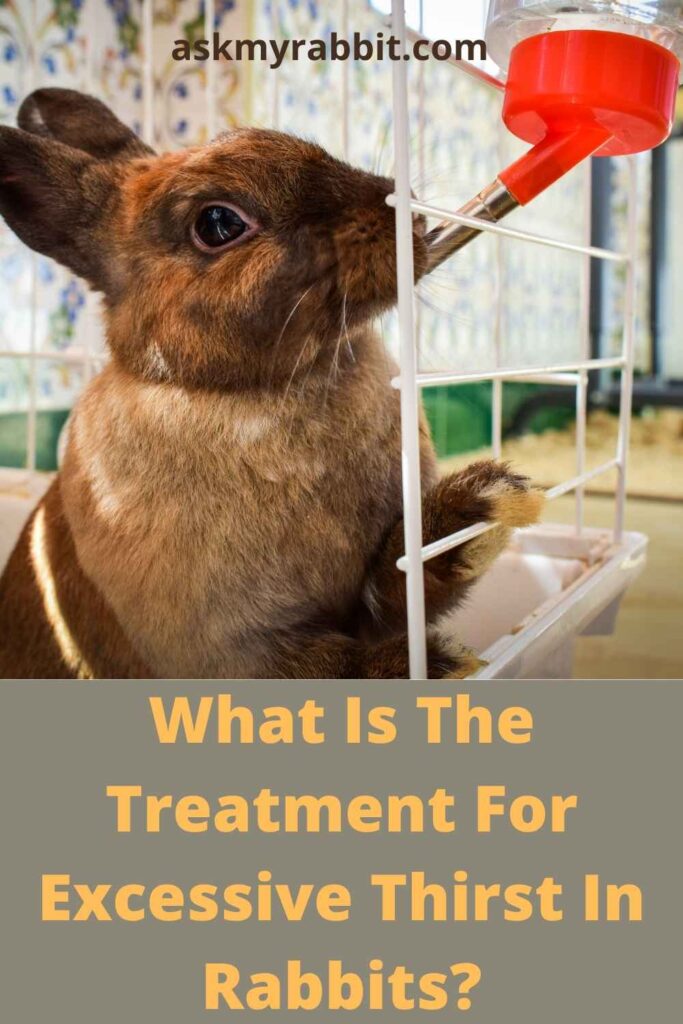It might be alarming to see your pet rabbit suddenly consume a lot of water. You may be concerned about the well-being of your furry bunny but have no idea what to do. Don’t worry, we are here to answer to all your questions.
So, why is your rabbit drinking a lot of water?
Polydipsia, or excessive thirst in rabbits, can develop for a variety of causes. Because certain illnesses are more dangerous than others, it’s critical to figure out what’s causing it.
If it’s summer, the urge to drink more water might be due to the heat. To keep themselves cool, rabbits drink a lot of water.
Rabbits might also drink more while they are shedding or just because they are used to it. It might be a medical issue like diabetes, renal illness, or tooth issues.
If you want to learn more about your pet bunny’s sudden need for excessive water, keep reading!

Do Rabbits Need A Lot Of Water?
Rabbits must always have access to a continuous supply of fresh water. Rabbits who consume a lot of fresh grass and greens drink less. However, rabbits who eat primarily hay drink more water.
Water serves four primary roles in a rabbit’s body, all of which are critical.
- It maintains the body’s cells and organs alive.
- It’s an important component of blood. It keeps everything in the stomach flowing.
- It removes extra calcium from the body.
Is It Normal For Rabbits To Drink A Lot Of Water?
Rabbits need a continuous supply of water. In fact, they consume a lot of it compared to other animals.
A rabbit’s daily water consumption ranges from 50 to 150 millilitres per kilogramme of body weight. In comparison, dogs require around 50 to 60 ml of liquids per kilogramme of body weight. A 2 kg rabbit may drink the same amount of water as a 10 kg dog each day.
Water is obviously necessary for your pet rabbit’s health and well-being. However, the amount of water your rabbit requires each day is very variable, since fluid consumption is influenced by a variety of factors.
How Much Water Is Too Much For A Rabbit?
Polydipsia and polyuria are medical terms for excessive drinking and urination. Interactions between the brain and the kidneys govern thirst and urine output in a delicate equilibrium.
As the body’s total hydration declines, increased urination activates thirst processes in the brain. This in turn promotes thirst in bunnies.
Excess thirst can also cause excessive urine, as observed in illnesses like diabetes. This is because the body tries to dilute toxins by drinking more, and the diluted blood subsequently causes more urination.
A rabbit with polyuria and polydipsia will consume more water and produce more urine.
The water bowl may become empty more frequently, and pee output may increase. The urine may seem lighter in colour and less concentrated.
Rabbits drink 50-150 ml/kg per day on average, thus a large 5 kilogramme rabbit will drink up to 750 ml per day on average. Anything beyond that might be odd.
Similarly, typical pee output is around 120-130 ml/kg/day. Thus, a big 5 kilogramme rabbit may urinate up to 650 ml per day, and anything more than that could be abnormal.
Why Is My Rabbit So Thirsty?
Excessive thirst might be caused by heat, increased exercise, or acute dehydration, or an underlying medical problem. The brain will respond to an increase in your rabbit’s urine by signalling thirst. Excessive thirst and fluid consumption, on the other hand, will result in increased urine.
Because there are so many probable explanations for your rabbit’s excessive thirst, it’s crucial to get your rabbit examined by a veterinarian to see whether there’s a problem.
The following are some of the possible causes of your rabbit being too thirsty:
- Increased thirst as a result of the warmer weather
- Diabetes
- Dehydration
- Kidney disease
- Hepatitis
- Medications
- Intake of high amounts of sodium chloride
- Behavioral problems
Why Is My Rabbit Suddenly Drinking Lots Of Water?
If you believe your rabbit is using too much water, it’s time to look into the problem. It’s tough to figure out what causes polydipsia in rabbits. This is due to the fact that there might be a variety of underlying reasons.
Some reasons are minor and are the consequence of changes in one’s lifestyle. These are typically straightforward to identify and repair at home.
Extreme thirst in rabbits can, on occasion, be a symptom of a medical problem, such as a sickness.
The following are the most common causes of your rabbit suddenly drinking lots of water:

1. Dehydration
Dehydration is commonly missed by rabbit owners, despite the fact that it seems evident. It’s possible that your rabbit is thirsty and drinking more than normal.
Rabbits are prone to dehydration. Diarrhea is one of the most common causes of dehydration because it produces a significant loss of fluids.
A simple skin test may be used to determine whether your rabbit is dehydrated.
- Take the skin on the back of your rabbit’s neck with your palm and gently squeeze it.
- Lift the skin upwards, allowing it to stretch out but not to the point of discomfort.
- Release the skin by opening your hand.
Your rabbit is healthy and hydrated if the skin snaps back to its original position.
If you’re not sure what’s causing your rabbit’s dehydration, see a veterinarian.
2. Diet Changes
Rabbits aren’t picky eaters, yet they are sensitive to poor nutrition. Many behavioral issues, including dehydration and can be traced back to dietary issues.
Two primary nutritional problems might be the cause of excessive thirst:
- Salt in excess. Too much salt dehydrates a rabbit’s bodily cells by removing water from them. Rabbits may become exceedingly thirsty as a result of this.
- They are not eating enough vegetables. Rabbits should consume a quantity of vegetables in addition to limitless hay. Because rabbits absorb a lot of water from their daily salad, a shortage of vegetables might cause them to get thirsty.
3. Overheating
Because of their thick fur coat, your rabbit might quickly overheat if they are in a sunny or warm environment.
We lose a lot of water when we sweat, so we drink extra to make up for it. Because rabbits cannot sweat, drinking cold water helps rabbits stay cool on the inside. They lose heat via their ears as well.
Signs that your rabbit is overheated, in addition to polydipsia, include:
- Ears that are hot
- Restlessness
- They’re lying on their stomachs, their bodies spread out.
- A runny nose
- Breathing that is shallow and rapid
- Rapid twitching of the nose
Overheating has the potential to be fatal. So get your bunny to a cool spot right away. Place an ice pack within their grasp if feasible.
4. Pain
When rabbits are in pain, they don’t usually show it. Revealing that they’re injured in the wild would make them a target for predators. As a result, detecting pain in a rabbit is difficult.
It’s not uncommon for people’s eating and drinking habits to change. A rabbit may drink significantly more or significantly less than normal. They may also grind their teeth, become angry, or sit for lengthy amounts of time bent over.
The following are some of the most prevalent causes of pain:
- Dental problems
- Raw patches of skin grow on the bottom of the foot, causing sore hocks.
- Arthritis
- Surgery, like as spaying or neutering, might cause an upset stomach if you consume too much. It’s a well-known occurrence to see a rabbit drink a lot of water following surgery.
5. Urinary Tract Disorders
Rabbits, like humans, can get urinary tract infections (UTIs). When germs enter the urinary system and reach the bladder, they create several problems.
UTIs are more common in certain rabbits than in others. This might be because of a weakened immune system or because of the structure of their urinary tract.
Rabbits with urinary tract infections may urinate often. Their urine may be darker or cloudier than normal. When urinating or being touched, they may also scream out.
Polydipsia isn’t a sign of a urinary tract infection. Rabbits with UTIs, on the other hand, tend to drink more since it dilutes their urine and relieves discomfort.
Other urological problems include kidney stones and bladder sludge. Too much calcium in the diet is the most common cause of these issues.
6. Diabetes
Diabetes is a condition in which your bunny’s body’s blood sugar cannot be controlled.
Polydipsia, polyuria, and polyphagia are all symptoms of diabetes in rabbits. Hyperglycemia, or elevated blood sugar, is the most common symptom.
7. Renal Failure
If your rabbit has this kidney or renal failure, it implies their kidneys aren’t functioning properly. They won’t be able to filter the blood, and they won’t be able to generate enough pee.
Renal insufficiency leads rabbits to drink more than they normally would. They may possibly be urinating more or less than normal.
Rabbits’ kidney failure is severe. If not treated promptly, it can induce fever and even death. Arrange for a veterinarian examination if you believe your rabbit’s kidneys aren’t functioning correctly.
8. Liver Disease
A rabbit’s liver may be just as deadly as renal failure if it is sick or damaged. The liver’s duty is to filter the blood and remove any poisons before it is circulated throughout the body. Your rabbit might become ill if it isn’t completing its job.
The liver can be affected by a variety of factors that lead it to stop working normally. Viruses can inflame it, and cirrhosis can scar and destroy it. It may even fail completely as a result of illness or the ingestion of a toxic chemical.
A rabbit with a malfunctioning liver may exhibit the following symptoms in addition to increased thirst:
- Appetite loss and weight loss
- Pain
- Jaundice
- Diarrhea
- Loss of weight
- Problems with the nervous system, such as a loss of coordination.
Liver damage, like renal failure, is deemed serious. It isn’t necessarily deadly, and it can be treated if discovered early enough.
9. Behavioral Causes
If none of the above apply to your rabbit, it’s possible that nothing is wrong medically. Excessive drinking in rabbits can become a taught behaviour, nearly a habit.
Boredom might be a contributing factor. Rabbits are clever animals who benefit from mental and physical stimulus. Excessive drinking may be filling in as a pastime if your rabbit has nothing else to do.
Drinking too much might be a symptom of anxiousness. Rabbits drink more when they are in a stressed setting, for reasons that are unknown.
Have your rabbit checked by a veterinarian in order to discover the reason for his excessive drinking habit.
What are the Symptoms of Polydipsia in Rabbits?
The medical word for increased thirst in rabbits is polydipsia. It is a symptom of an underlying problem, not a sickness or disease in and of itself.
It’s possible that your rabbit’s polydipsia is caused by a medical problem. However, there might be a behavioural or environmental factor at play.
Polyuria is frequently accompanied with polydipsia. This is when a rabbit pees more often than normal.
The symptoms of polydipsia in rabbits are :
- Appetite increased or decreased
- Depression
- Fever
- Loss of weight
- Defecating less frequently than usual
- Diarrhoea
- Signs of discomfort, such as teeth grinding
- Aggression and other behavioural issues
Do Baby Rabbits Drink A Lot Of Water?
Baby rabbits do not drink water during the first three to four weeks. They will only consume their mother’s milk. However, babies can start drinking water after the first month of their lives.
When they are old enough to drink water, baby rabbits do not drink nearly as much as full-grown rabbits. They should not be drinking excessively at only a month old.
If you notice them doing so, they are likely suffering from an underlying medical condition and should be seen by a veterinarian right away.
After a month, baby rabbits may drink from the same water bottle as an adult rabbit as long as the water bottle is low enough for their little lips to grasp.
Why Is My Rabbit Drinking A Lot Of Water But Not Eating?
When rabbits stop eating, it’s typically a sign that something is wrong. They’re hard-wired as prey animals to continue on as if nothing is amiss in order to avoid seeming weak to predators.
Your bunny is drinking a lot of water but not eating due to the following reasons:

1. Pain
Rabbits under discomfort will stop eating and become extremely silent. The discomfort might be anywhere. Post-surgical pain, as well as joint pain, are typical reasons for rabbits to refuse food.
2. Dental Issues
Another very typical reason for rabbits to stop eating is because of this. Rabbits’ teeth are constantly growing, which is a smart adaptation to the abrasiveness of their primary food, grass.
Overgrowing teeth can occur in rabbits that eat the incorrect foods, chew in the wrong way, or were born with abnormalities.
This results in jaw pain as well as ulcers on the tongue or cheek, which ache every time the rabbit chews. It’s critical to get your rabbit’s teeth evaluated by a veterinarian on a regular basis to ensure that any issues are identified and addressed before too much harm is done.
3. Digestive Issues
Bunnies with a problem with their digestion may stop eating or become more picky about the food they do consume.
Rabbits who consume things they shouldn’t may have a blockage or ‘impaction.’ This is a highly severe condition that can be difficult to treat, necessitating emergency surgery in certain cases.
4. Stress
Your pet bunny may not be eating enough due to stress. Even the slightest of changes can trigger stress and anxiety in your pet. Consider your rabbit stressed if you obtain a new pet or a new family member. If your routine changes, keep an extra careful check on them during these times.
Why Is My Rabbit Drinking A Lot Of Water And Losing Weight?
Polyuria can result from psychogenic polydipsia. The disease might be behavioural or physical in nature, and it can only be ruled out as a cause of polydipsia and polyuria after all other possibilities have been eliminated.
If feeding is too uncomfortable, rabbits with dental illness may try to fill up on water. The rabbit may drink excessively in an attempt to feel full, which will result in increased urine. These rabbits will lose weight, become unhealthy, and seem unhappy.
Rabbits who are bored, lonely, or worried may seek solace in drinking, particularly from water bottles, since they frequently ‘play’ with the ball-bearing in the bottle’s tip. This may result in polydipsia and polyuria.
How Much Water Should A Rabbit Drink In A Day?
There are three primary elements that determine how much water your rabbit should drink:
- The weight of your bunny
- The way of life of your rabbit
- Seasonal variations
Rabbits that are larger need to consume more water than rabbits that are smaller. They have larger bodies, eat and defecate more frequently, and require more fluids to maintain hydration.
A healthy rabbit should drink 50 to 150 mL of water per kilogramme of body weight each day.
The amount of activity your rabbit engages in can have a significant impact on their water consumption. Rabbits who are more active and run about all day will need to drink more than bunnies who are sedentary.
Seasonal variations can also play a role. When rabbits are going through their yearly shed, they tend to drink more water. During the warmer months of the year, they’ll also consume extra water.
Even when all of the above criteria are taken into consideration, some rabbits appear to be thirstier than others. What one rabbit considers typical may not be so for another. However, you should be worried if your rabbit has suddenly begun drinking more for no apparent reason.
What Is The Treatment For Excessive Thirst In Rabbits?

If your rabbit is drinking excessively, the first thing you should do is figure out why.
Examine your rabbit’s eating habits. Make some minor adjustments and keep track of the results.
Keep an eye on the weather and the season. Your rabbit may be too hot if they reside outside or in a room without air conditioning. See what happens if you move your bunny to a cooler location.
Over the course of two to three days, keep an eye on your rabbit’s drinking habits. Use a clearly marked water dish or bottle to keep track of how much they’ve consumed.
Don’t limit their access to water and let them drink as much as they want.
These are signs that your rabbit may be suffering from a serious illness:
- No eating or drinking
- Weight loss
- Constipation
- Diarrhoea
- No urination or defecation
Take your rabbit to an emergency veterinarian if you detect any of the following symptoms. They’ll use tests like urine and blood analysis to discover out what’s wrong.
You can start therapy once you’ve received a diagnosis. This will differ based on the illness.
Antibiotics, for example, may be adequate if your rabbit has an infection. However, if the problem is more serious, such as renal failure, more drastic measures will be required.
Frequently Asked Questions
What Can Rabbits Drink Besides Water?
Rabbits can water, coffee, milk, tea, juice, etc. besides water.
Why Do Bunnies Lick You?
Bunnies groom each other by licking. It’s a show of affection if your rabbit licks you, since you’ll commonly observe pairs of bunnies grooming each other in this manner.
Why Is My Bunny Drinking Too Much Water?
If your rabbit is drinking more than normal, it might mean he’s in pain or stressed out.
Final Words
If your rabbit is drinking more than normal, it might mean he’s in pain or stressed out. Make sure nothing in their home is causing them any distress.
If you can establish that your rabbit’s excessive water intake is due to anything that isn’t a concern, such as a highly active rabbit or a shift in season, you don’t need to worry. You may let them drink as much as they like at this time.
You should call your veterinarian if your rabbit continues to consume a lot of water for a prolonged length of time.
We request that you drop down your queries regarding your pet bunny in the comment section below. We will answer them soon!






